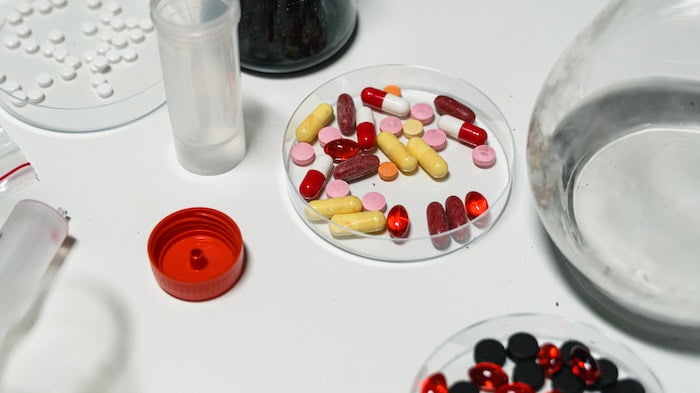- Home
- Addiction Guides
- Is Alcohol a Depressant?
Is Alcohol a Depressant?
Why Do We Consume Alcohol?
Alcohol is a highly addictive substance. Despite how much people will spend and the many hangovers people suffer due to their excessive and heavy drinking habits, people will return to alcohol each week.
They may even indulge in activities which include alcohol consumption more frequently, in order to undergo the same experience it brings, despite its known consequences.
Many of us are aware of the negative health, financial, and social implications that alcohol can have on us, yet we continue to engage in alcohol consumption. This is because the more we drink alcohol, the more we associate dopamine and serotonin in our brains.
This makes us physically and psychologically dependent on alcohol to experience a particular form of pleasure and elation.
The Effects of Alcohol on the Body and Mind

It’s no secret that alcohol has a range of negative effects on our bodies. Many accidents, injuries, illnesses, and deaths are attributed due to alcohol.
The number of alcohol-specific and alcohol-related mortality is staggeringly high in the United Kingdom and globally, and it is one of the leading causes of preventable deaths in the world.
Despite the known effects of alcohol, people keep consuming the highly addictive and highly detrimental substance. Physically, alcohol exposes us to a range of cancers such as breast cancer, throat cancer, rectal cancer, and more.
It also exposes us to diseases such as Alcohol-Related Liver Disease, cardiovascular disease, and more. Alcohol weakens our immune system, interferes with our sleeping rhythm, leads to nutritional deficiency, and does much more to weaken and damage our bodies.
However, as we all know, the effects of alcohol are not restricted to the body. Frequent and heavy drinking can have a profound effect on our minds and mental health.
These mental health consequences of excessive drinking are multi-varied and can manifest in many different ways.
Is Alcohol a Depressant?
One of the biggest reasons that alcohol affects our mental health so profoundly is that alcohol is a depressant.
Alcohol can affect our mood profoundly. It can make some people feel temporarily relaxed or happy, whereas it may make other people irritable, aggressive, and violent.
When we consume alcohol, a chemical change in the brain takes place. This chemical change leads to a significant alteration in our levels of dopamine and serotonin, which are our ‘feel good chemicals’, influencing how we feel when we engage in particular activities.
What is a Depressant?
A depressant is a type of drug or substance which affects the central nervous system, or CNS. Rather than stimulating the person’s brain or central nervous system, depressants reduce arousal and stimulation by depressing the central nervous system.
The central nervous system consists of our brain and spinal cord. Obviously, our brain helps our body function and it can process some of the physiological changes that happen in the body.
It needs the spinal cord and its neurotransmitters, or chemical messengers, to do so.
The central nervous system is vital towards our thoughts, feelings, behaviours, and also our survival. By depressing the central nervous system, brain activity is slowed down.
This is because its neurotransmitters, or chemical messengers, are disrupted. These chemical messengers help us to regulate breathing, mood, concentration, sleep cycles, and much more.
When someone consumes a substance which is deemed to be a depressant, they may initially feel symptoms such as relaxation, decreased anxiety, drowsiness, sleepiness, and more. This is because it has the opposite effect to a stimulant such as caffeine or cocaine, for example.
However, other and concerning symptoms may manifest such as poor coordination, slurred speech, dizziness, nausea, fatigue, weakness, and more.
While depressants may initially relax people, make them feel less worried or anxious, and provide them with feelings of elation and happiness, it will then have the opposite for people who consume alcohol in excessive quantities.
Following a session or episode of excessive or heavy drinking, people will find that their feelings of anxiety have been heightened, as well as feelings of stress and irritability, and their sleep quality has been reduced greatly.
GABA, a form of neurotransmitter which blocks messages between receptors, is increased temporarily when someone consumes alcohol. This is why they will begin to feel relaxed and have a great reduction in stress levels because neurotransmitters in their brain are not stimulated, but depressed and therefore do not receive these signals.
Does Consuming Depressants Lead to Depression?

Depressant doesn’t necessarily mean the substance will make someone depressed. The term depressant here refers to the lowering of activity in the brain.
The activity in the brain and central nervous system slows down, and people’s levels of stimulation are reduced significantly.
However, frequently or excessively consuming substances which are classified as depressants has the capacity to lead to or exacerbate existing symptoms of depression.
Not only can depressants cause depression, but they can also cause a wide range of mental health disorders if consumed too much.
Which Other Substances are Depressants?

There are many other examples of substances which are depressants in addition to alcohol.
Some of these examples of depressive substances include but aren’t limited to:
- Cannabis: Cannabis can act as both a stimulant, hallucinogen, and also depressant, and it takes longer for the body to remove traces of cannabis than it does with alcohol. People typically consume cannabis in order to feel relaxed, however, it can also lead to symptoms such as slurred speech, nausea, memory loss, and more.
- Benzodiazepines: Benzodiazepines are prescription drugs which are also depressants. One notable example of a Benzodiazepine is Valium, which is used to treat anxiety, muscle spasms, and more.
- Ketamine: Ketamine, which is sometimes used as a form of anaesthetic for people and animals, is also a depressant.
- Opioids: Substances such as Heroin or Morphine belong to the class of Opioids, which is also a class of substances which act as depressants.
If people are mixing alcohol with other substances which are also classified as depressants, it could lead to intensified symptoms and mental health complications.
People often mix alcohol with substances such as cannabis, and alcohol can increase the absorption of properties of cannabis. This can intensify effects and lead to symptoms such as anxiety and depression even sooner.
How Alcohol Affects Our Brains
So, when we consume alcohol, we can expect to experience similar symptoms to many of the other substances which are depressants.
People who consume alcohol will initially experience greater levels of relaxation, reduced levels of stress and anxiety, and they may even feel sleepy.
However, too much alcohol consumption will lead to significant impairment in speech coherence, coordination, reaction time, memorisation, sense of judgement, disrupted sleep cycles and so on.
Too much alcohol can lead to alcohol poisoning. In addition to physical symptoms of alcohol poisoning such as vomiting, it can cause people to lose consciousness, experience respiratory failure, and seizures, and it can even lead to death.
Following a session of frequent or heavy drinking, people will suffer from a range of symptoms.
In addition to typical symptoms of hangovers, people may suffer from a heightened sense of anxiety or depression, in what people typically refer to as ‘hangxiety’, which is an amalgamation of both ‘hangover’ and ‘anxiety’.
Alcohol, Self Medicating and Addiction

People often turn towards alcohol as a form of self-medication and as a form of coping mechanism.
If anyone is suffering from worries and stress, or serious mental health disorders such as anxiety, depression, trauma, and so on, they may turn towards alcohol in order to relieve these symptoms.
This is because not only is alcohol a depressant, therefore temporarily reducing feelings of stress, worry, and anxiety, alcohol temporarily boosts dopamine and serotonin.
This makes the person associate alcohol consumption with happiness and stress relief. The phrase used to describe this action is ‘self-medicating’.
Ironically, though, alcohol affects someone’s natural ability to produce serotonin and dopamine in the long term. This can lead to problems producing these chemicals naturally, and it could lead to mental health complications such as anxiety and depression.
However, by this point, the person has an increased tolerance to alcohol since they have consistently consumed alcohol in order to replicate these feelings of euphoria. This means that they require higher levels of alcohol in order to feel the same effect as they did previously, in this case, a reduction in anxiety.
But, higher levels of consumption will lead to more extreme forms of hangovers, and it will impact the person’s natural ability to produce serotonin and dopamine even more.
In turn, they will develop a condition such as alcohol use disorder (AUD) since they consistently turn to it in order to treat their persistent and intensifying feelings of anxiety. This will create a dangerous cycle of both symptoms of anxiety and alcohol addiction.
While it may temporarily ease people of their anxious feelings, alcohol merely masks these feelings, rather than addressing the problem specifically.
This means that their anxiety, caused by past trauma, fears, stress, and so on, is not treated at all, but only buried deeper. These feelings of anxiety will continue to manifest in different ways, whether it comes through anger, irritability, violence or even through physical symptoms.
This is a contributing factor to why so many people who suffer from alcohol use disorder also suffer from anxiety and depression. These people suffer from co-occurring disorders because they either turned towards alcohol in order to treat anxiety, or developed anxiety from consuming excessive amounts of alcohol.
In fact, around 60% of people who enter a drug and alcohol rehab in the United Kingdom also need mental health treatment.
They have mental health disorders such as anxiety, depression, bipolar disorder, trauma, and more. Clearly, alcohol poses a great risk to someone’s anxiety levels and their decision-making.
How Alcohol Affects Our Anxiety Levels
Alcohol can cause profound physiological changes in our brains, and anxiety can be one of the symptoms of excessive consumption.
Similarly, excessive alcohol consumption can be the result of anxiety. Alcohol and anxiety disorders have a mutually destructive relationship, despite the irony of people consuming alcohol in order to overcome feelings of anxiety and stress.
It is thought that alcohol affects our amygdala, the area of the brain which is responsible for managing feelings of anxiety and stress. And while alcohol may temporarily boost our serotonin levels, making us feel happier, it can decrease our serotonin levels in the long term.
Because it is a depressant, the production of serotonin in the brain of frequent and heavy drinkers is reduced significantly. This can lead to a range of mental health disorders such as anxiety and depression.
Alcohol’s Relationship With Our Sleep Quality

Additionally, alcohol, despite making us feel sleepy and drowsy, reduces our quality of sleep significantly. Research shows that alcohol can reduce your sleep quality by up to 40%, regardless of how many hours we are able to get during our sleep.
This is because alcohol prevents us from maximising our REM sleep, which helps us to memorise things, improve our motor skills, and produce energy.
When we are lacking in sleep, our cortisol levels are increased. Cortisol is a primary ‘stress hormone’, and too much of it will lead to chronic stress, high blood pressure, a suppressed immune system, and heightened anxiety.
These factors when combined can profoundly deteriorate the physical and mental quality of life someone has. Not only will people feel more anxious, less energetic, and more irritable, they will suffer physically as well.
They will be more susceptible to illnesses, and their risk of developing cancer and other diseases will be far higher.
So, not only does alcohol reduce our levels of ‘feel good’ chemicals in the long term, it affects other areas of our life which have the ability to alter our moods and feelings.
Alcohol’s Effect on Depression, Self-Harm, and Suicide Ideation
Since alcohol is a depressant, it affects the natural chemistry in our brains.
Specifically, it affects our brain’s natural level of happiness and ability to produce chemicals which make us feel happy.
When you combine alcohol with someone who is susceptible to or already suffering from depression, their risks of developing mental illness will be higher and their symptoms will be intensified significantly.
Depression is a very complex mental illness. It is thought that there is a chemical imbalance in the brain, among other various complex facets such as prolonged and intensified periods of stress or traumatic life events, for example.
Studies show that alcohol dependence is around three times more prevalent among the population of those who are diagnosed with depression when compared to the general population.
In addition to what alcohol does to our natural chemical levels in the brain, too much alcohol consumption for a prolonged period of time can lead to brain shrinkage and atrophy in the form of deficiencies in the brain’s matter.
Long-term exposure to cortisol may lead to brain shrinkage, and people who are depressed also suffer from deficits of grey matter in the brain.
Deterioration and reduction in brain matter are also associated with heavy and extended alcohol consumption.
Self Harming and Suicide Ideation
In addition to consuming alcohol as a form of coping mechanism, people may turn towards self harm.
Both are some of the most negative forms of coping mechanisms that people will develop if they are experiencing symptoms of depression.
While it may provide them temporary relief, it will progressively worsen as time goes on without seeking treatment.
If someone is suffering from depression and engages in acts such as self-harm, consuming alcohol will only increase the risk and severity of their self-harming behaviour. Alcohol interferes with our inhibitions and sense of judgement, and it can increase irritability, aggression, and violent behaviour.
When pairing alcohol consumption with feelings of anger or sadness and thoughts of self-harm, it is far more likely that the person will commit to inflicting physical pain on themselves.
Not only will this cause physical pain, it will interfere with their ability to develop healthy and positive coping mechanisms.
People who are likely to or are engaging in acts of self-harm are also more likely to be exposed to suicide ideation. Additionally, studies show that there is a strong correlation between those who are alcohol dependent and those who experience suicidal thoughts.
Alcohol consumption will only lead to progressively worse physical and mental health, which exposes people to worse symptoms of depression and thoughts of suicide.
Because alcohol severely impedes our sense of judgement and inhibition, it can become a significant driving force in making someone likely to perform acts which will lead to their death.
How Abstaining From Alcohol Can Reduce Symptoms of Anxiety and Depression

If someone is suffering from depression, they will need to seek treatment from licensed health professionals.
It is unlikely that only one change will relieve someone of their depression, as it is a complex mental health disorder which is affected by a range of variables.
However, there are many benefits to be had from abstaining from alcohol. Some of these benefits are physical, such as weight management, higher nutritional intake, improved immune system, hydration, skin health, and much more.
These physical improvements can also have a significant improvement on someone’s mental health. People will be able to live more actively, they will experience far fewer cravings for unhealthy food, their nutritional intake will be far higher with the absence of alcohol, their liver will heal, and they will be far less likely to develop cancers or diseases.
However, there are many more benefits to be had from abstaining from alcohol in the form of mental benefits.
Subjects who abstain will experience higher-quality sleep, increased energy, higher cognitive performance, and much more. One notable benefit to be had from abstaining is reversing brain shrinkage.
If brain cells die, which alcohol consumption can contribute to, damage can be permanent and irreversible. However, brain shrinkage can also be attributed to cells changing sizes, and not necessarily dying as a result of alcohol consumption.
By abstaining from alcohol, people can reverse these effects. Studies show that after a few weeks of abstinence from alcohol, the brain will have recovered significantly from some of its alcohol-induced effects.
Developing Healthier Coping Mechanisms and Skills
Not only does consuming alcohol intensify someone’s mental health problems, but using it as a form of self-medication prevents them from developing healthy coping mechanisms.
This is because people will identify alcohol as the most immediate and accessible form of relief, when it is in fact detrimental to our health.
Coping mechanisms are important skills in order to deal with frustrating, emotional, and unpleasant situations in life. Difficulty and hardships are inevitable in life, therefore, we need to develop healthy and constructive coping mechanisms in the face of adversity.
By developing healthy coping mechanisms, people can ensure that they will learn new skills and forms of stress management which will benefit their well-being as well as relationships with others in the long run.
Some prominent examples of coping mechanisms include:
- Meditation: Studies have shown that people who regularly meditate have a higher amount of grey matter in the brain. Grey matter helps people to control their emotions more effectively and is often reduced in people who are suffering from addiction or depression.
- Breathing Exercises: Breathing exercises can help us lower heart rate, blood pressure, and increase relaxation, all of which will reduce symptoms of anxiety or depression.
- Exercise: Exercise, whether in the form of running, yoga, weight lifting, or else, can give us a ‘natural high’. Not only will exercise make you physically fitter, but it can also remodel reward systems so that you experience dopamine release in the brain after exercise.
- Asking for support: This is a problem-focused coping mechanism. Support, whether emotional or professional, can help people overcome immediate problems.
- Developing new perspectives: Developing new perspectives and philosophies can help us develop psychological flexibility. Rather than being overwhelmed by negativity in your life, you can learn to overcome them and not let them define you through a healthy outlook.
- Completing tasks: By completing tasks whether in the form of cooking, gardening, or else, the mind is preoccupied and instead of worrying, it will be committed to completing goals step by step, which can foster behavioural activation, which is an effective method of treatment for depression.
How to Abstain From Alcohol Through Lifestyle Changes
Abstaining from alcohol is ultimately a lifestyle change. In order to overcome the effects of alcohol, you will need to abstain entirely.
This is because even moderation of alcohol consumption will still result in deterioration of physical and mental health.
While it may seem simple, to just stop drinking, it can be a very difficult task, especially for those who are suffering from alcohol addiction.
Below are different ways in which people can abstain effectively in addition to the new coping mechanisms they will have developed.
1. Develop a “One Day at a Time” Mentality
In fellowship groups such as Alcoholics Anonymous, members are encouraged to develop a “one day at a time” mindset.
For some people, abstinence may carry the connotation of not indulging in something for an entire lifetime. This can make the task seem overwhelmingly daunting.
People can make abstinence easier for themselves by modifying their mindset. Rather than viewing abstinence as a lifelong commitment towards avoiding alcohol, they can take it one day at a time.
By setting a daily goal of not consuming alcohol within the next 24 hours, abstinence will become much more manageable.
2. Find a Community or a Support Network of Abstainers

Abstinence can also be a social event, with challenges such as Sober October and Dry January integrating fun and social aspects with abstinence from alcohol.
These challenges, although having a goal of abstaining for a month, can help people improve their mental and physical health, and allow them to actually experience the benefits before abstaining further.
People are able to share their achievements with others who are taking part in the same challenge, and this can encourage social reinforcement thoroughly. The more that someone’s abstinence is celebrated and encouraged, the more likely they are to continue on their journey of sobriety.
Furthermore, people can also seek a new form of a support network by joining fellowship programmes and attending support sessions. Some popular examples of these are groups such as Alcoholics Anonymous and SMART Recovery.
These groups are typically nonprofit and apolitical, meaning that they have no ulterior motive to enforce political or religious agendas or make money, instead, they are dedicated to helping their members.
During support sessions, members will be able to share their experiences with others. Sharing your thoughts, feelings, and experience with your addiction and mental health problems can be a very effective form of ‘catharsis’, also known as purging, which is a form of emotional release.
Additionally, you will be able to gain insight into other people’s experiences of addiction and recovery. While members remain anonymous by only sharing their first names, there is nothing stopping members from meeting up in addition to their support sessions in order to help one another.
These groups tend to practise things such as the 12-Step Facilitation Programme in order to support them maintain their sobriety.
The 12-Steps of AA provides members with structure and steps which will help them maintain their abstinence more effectively.
Some of these steps include:
- Admitting we are powerless to alcohol, and that abstinence is the only way of overcoming its effects.
- Taking moral inventory of ourselves.
- Understanding who else was harmed due to our problems.
- Being willing to change character defects which we have control over.
Some studies seem to suggest that people who are suffering from drinking problems who take part in support sessions are up to 6 times more likely to sustain their sobriety than someone who tries to abstain from alcohol independently.
How to Abstain From Alcohol With Professional Support

People who are suffering from alcohol addiction can also receive the necessary support from licensed health practitioners and addiction psychiatrists. By entering an alcohol rehab facility, they will be able to undergo various forms of therapy and counselling in order to combat their alcohol addiction.
When someone’s addiction is severe enough, they will need to seek the support of professionals in order to help them recover safely.
Some people may be moderately dependent on alcoholic substances and are able to abstain safely. However, some people may suffer from an extreme case of alcohol addiction which could cause physical harm or even lead to death.
Patients will be able to abstain safely at an alcohol rehab by undergoing a supervised medicated detox. Here, they can allow alcohol to withdraw from their body with the support of a team of medical professionals.
Depending on the individual case of addiction, the patient may even be prescribed medication in order to reduce alcohol withdrawal symptoms.
References
[1] Local Alcohol Profiles for England – Mortality Due to Alcohol https://fingertips.phe.org.uk/profile/local-alcohol-profiles/supporting-information/mortality2
[2] Central Nervous System (CNS) Structure and Function https://www.simplypsychology.org/central-nervous-system.html
[3] Marijuana’s Effects on Human Cognitive Functions, Psychomotor Skills and Personality https://pubmed.ncbi.nlm.nih.gov/3009708/
[4] Alcohol and Sleep https://www.sleepfoundation.org/nutrition/alcohol-and-sleep
[5] Alcohol and Depression https://www2.hse.ie/wellbeing/alcohol/mental-health/depression.html
[6] Alcohol Use and Misuse, Self Harm and Subsequent Mortality https://emj.bmj.com/content/32/10/793
[7] Suicidal Behaviour and Alcohol Abuse https://www.ncbi.nlm.nih.gov/pmc/articles/PMC2872355/
[8] Five Surprising Ways Exercise Changes Your Brain https://greatergood.berkeley.edu/article/item/five_surprising_ways_exercise_changes_your_brain
[9] Go Sober for October https://www.gosober.org.uk/
[10] Dry January – Alcohol Change https://alcoholchange.org.uk/help-and-support/managing-your-drinking/dry-january
[11] Alcoholics Anonymous https://www.aa.org/
[12] SMART Recovery https://www.smartrecovery.org/
[13] The 12 Steps of AA https://www.alcoholics-anonymous.org.uk/about-aa/the-12-steps-of-aa




